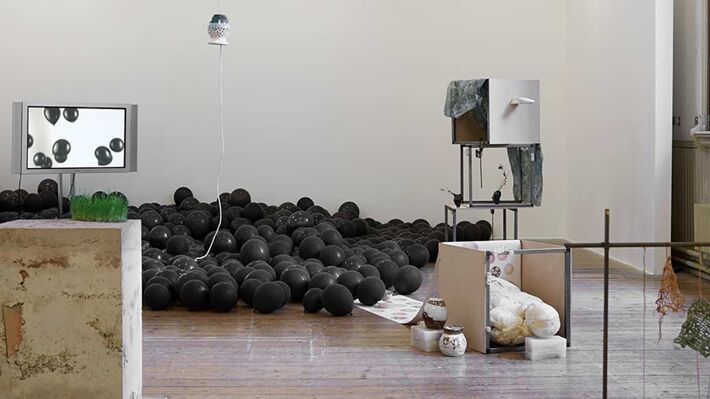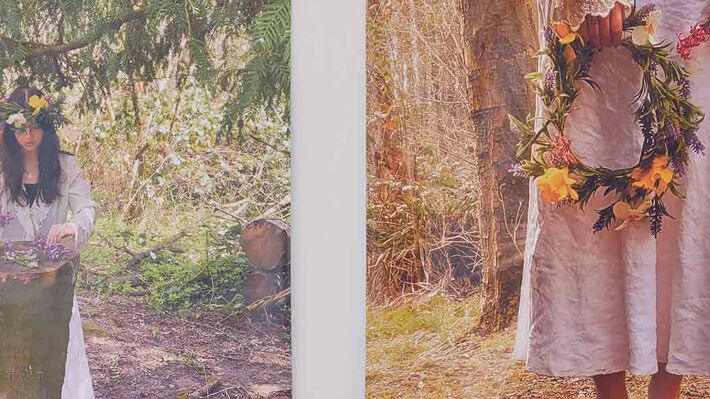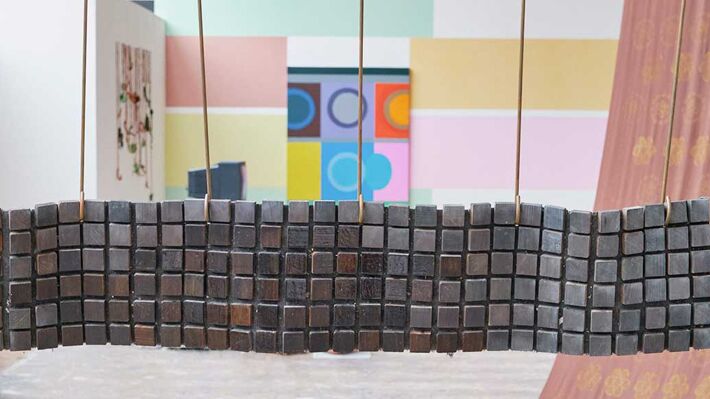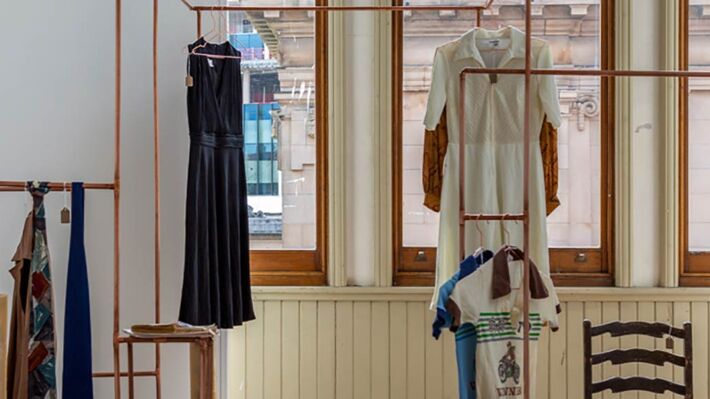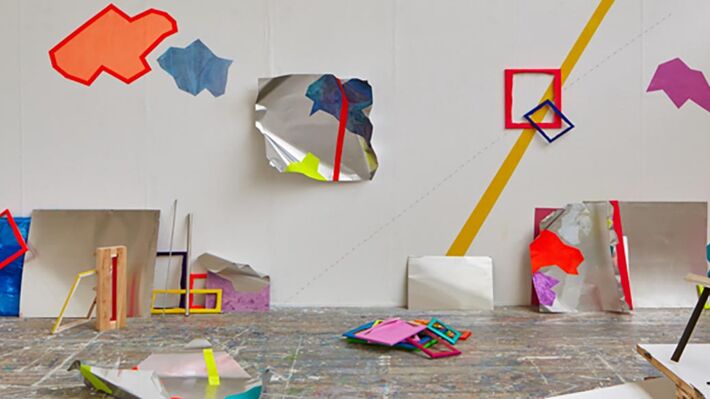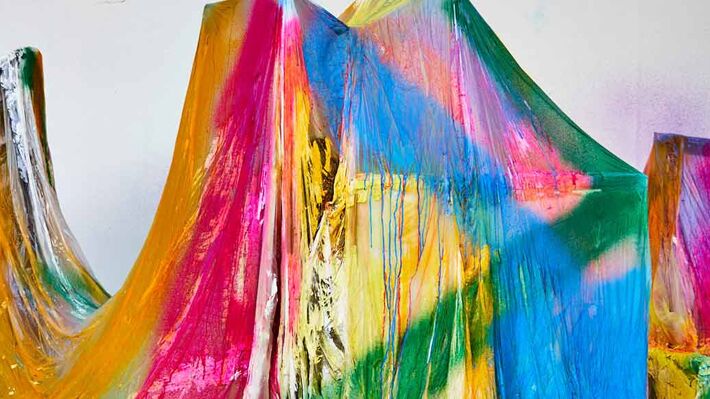Fine Art - BA (Hons)
Currently viewing course to start in 2026/27 Entry.
Through the skilful manipulation of materials, processes, and ideas, you, as an artist, will be able to offer creative insights that shape who you are and how you exist in the world around you. These are valuable skills in the fast-changing and interconnected web of ecological, political, socio-economic, and philosophical contexts....
- Level Undergraduate
- Study mode Full Time
- Award BA (Hons)
- Start date September 2026
- Fees View course fees
- Subject
- Location Margaret Street
This course is:
Available with Professional Placement year
Open to International Students
Overview
Through the skilful manipulation of materials, processes, and ideas, you, as an artist, will be able to offer creative insights that shape who you are and how you exist in the world around you. These are valuable skills in the fast-changing and interconnected web of ecological, political, socio-economic, and philosophical contexts.
The BA (Hons) Fine Art course will help you embrace important traditional making skills such as painting, drawing, printmaking, sculpture, installation, digital media, and performance, while also encouraging you to fuse these with new developments in creative practice. This will be framed within a professional working context to improve your employability. This hybrid approach, along with discipline-specific studios and specialist workshops, will equip you to navigate the evolving landscape of the Creative Industries into the future.
What's covered in this course?
The course is based on four key principles: Making Skills, Making Public, Making Communities, and Making a Living.
Making Skills will be developed through purpose-built studio spaces, allowing you to explore materials and processes in painting, drawing, sculpture, installation, digital media, and performance. You’ll acquire and apply technical skills in workshops and through collaboration with fabricators from across Birmingham and beyond. These skills will become the foundation for you to test, interrogate, and transform your art practice both conceptually and aesthetically.
Making Public will encourage you to explore art practice in the public realm. This includes expanded ideas of exhibiting and sharing your outcomes in ways that generate participation with broad audiences. You’ll benefit from live projects and our close links with high-profile establishments, including Eastside Projects, Grand Union, Ikon Gallery, and Birmingham Museum and Art Gallery. These opportunities will help you develop your thinking about the process of making your work public.
Making with Communities will ask you to consider ways to build and sustain meaningful relationships between your art practice and society. You will form Communities of Practice through studio groups and engage with local, national, and international organisations, gaining cultural and global perspectives and experiences. This valuable experience will help you define the future direction of your practice.
Making a Living will focus on your personal development and the various ways you can build and grow a successful creative career. You’ll establish a professional context for your work by gaining a situated knowledge of the art sector. The advancement of the digital world has provided artists with numerous opportunities to thrive in a creative environment, and you’ll be taught the new skills and behaviours necessary to face the exciting challenges awaiting you in the world of employment after your studies.
Professional Placement year
This course offers an optional professional placement year. This allows you to spend a whole year with an employer, following successful completion of your second year, and is a great way to find out more about your chosen career. Some students even return to the same employers after completing their studies.
If you choose to pursue a placement year, you will need to find a suitable placement to complement your chosen area of study. You will be able to draw on the University’s extensive network of local, regional, and national employers, and the support of our Careers teams. If you are able to secure a placement, you can request to be transferred to the placement version of the course.
Please note that fees are payable during your placement year, equivalent to 20% of the total full-time course fee for that year.
Grand Union and Birmingham City University are part of the same arts ecology in the city, the region and beyond. By embedding employability into all stages of the curriculum of the BA Fine Art course students graduate with the skills and confidence to flourish in the contemporary art world and the wider creative industries.
Cheryl Jones, Director Grand Union
Why Choose Us?
- Our Margaret Street School of Art home was the first municipal art school in the UK. Its Grade I-listed building has been the inspiration for countless artists and practitioners of international repute. It is a site of creative art practice that resonates with its rich history and as a fine art student you would be joining a community of like-minded individuals who learn, make and grow here.
- You will work across specialist dedicated studio spaces which support the development of painting, drawing, sculpture, printmaking, installation, digital media and performance skills.
- Our emphasis on Making Skills, Making Public, Making a Living and Making with Communities places a focus on the development of technical and practical skills, valuable not only to the production of artwork, but to your ability to make a living through employing these skills, post-graduation, within a number of sectors who you will build networks with.
- You will have regular opportunities to exhibit your work through curating student-led exhibitions in the School of Art and in spaces across the city, culminating in the Graduate Show in your final year.
- The course draws on Birmingham’s unique position as the No. 2 city in the UK. The city has a rich cultural and industrial history which is embedded in the course, students will engage with Birmingham’s past and with the exciting contemporary environment of the city today.
- Focus on crafting a sustainable career in the arts; develop entrepreneurial skills in making art public and accessible; learn how to communicate with diverse audiences, communities, and partners to cultivate culture in the region and beyond.
Open Days
Join us for our next Open Day where you'll be able to learn about this course in detail, chat to students, explore our campus and tour accommodation. Booking isn't open for the next event yet. Register your interest, and we'll let you know as soon as booking goes live.
Next Open Day: Friday 26 June
Entry Requirements
Essential requirements
Standard offer: 112 UCAS Tariff points. Learn more about UCAS Tariff points.
Accelerate offer: 80 UCAS Tariff points. Find out more about BCU Accelerate.
As creativity is an important part of this course, you are expected to submit a portfolio as part of the selection process. This is your opportunity to show your ideas and skills to our tutors.
If you are not studying a creative subject at Level 3, you can still apply for this course. Our portfolio guidance information includes alternative options for how you can show us your passion for art.
If you have a qualification that is not listed, please contact us.
Fees & How to Apply
UK students
Annual and modular tuition fees shown are applicable to the first year of study. The University reserves the right to increase fees for subsequent years of study in line with increases in inflation (capped at 5%) or to reflect changes in Government funding policies or changes agreed by Parliament. View fees for continuing students.
Award: BA (Hons)
Starting: Sep 2026
- Mode
- Duration
- Fees
- Full Time
- 3 years
- £9,535 in 2026/27 ✱ Important note for this price
- Apply via UCAS
(↩Back to price) * The Government is proposing to apply an inflationary increase to regulated tuition fees for 2026/27 and the University is planning on increasing fees to that maximum level once confirmed.
International students
Annual and modular tuition fees shown are applicable to the first year of study. The University reserves the right to increase fees for subsequent years of study in line with increases in inflation (capped at 5%) or to reflect changes in Government funding policies or changes agreed by Parliament. View fees for continuing students.
Award: BA (Hons)
Starting: Sep 2026
- Mode
- Duration
- Fees
- Full Time
- 3 years
- £18,570 in 2026/27
Guidance for UK students
UK students applying for most undergraduate degree courses in the UK will need to apply through UCAS.
The Universities and Colleges Admissions Service (UCAS) is a UK organisation responsible for managing applications to university and college.
Applying through UCAS
- Register with UCAS
- Login to UCAS and complete your details
- Select your course and write a personal statement
- Get a reference
- Pay your application fee and submit your application
Guidance for International students
There are three ways to apply:
1) Direct to the University
You will need to complete our International Application Form and Equal Opportunities Form, and submit them together with scan copies of your original academic transcripts and certificates.
2) Through a country representative
Our in-country representatives can help you make your application and apply for a visa. They can also offer advice on travel, living in the UK and studying abroad.
3) Through UCAS
If you are applying for an undergraduate degree or a Higher National Diploma (HND), you can apply through the UK’s Universities and Colleges Admissions Service (UCAS).
You can request a printed form from your school or nearest British Council office. You will be charged for applying through UCAS. Birmingham City University’s UCAS code is B25 BCITY.
Portfolio guidance
If you receive an offer to study this course, you will be required to submit a portfolio. We ask that this is submitted within four weeks of receiving your offer.
Please see our portfolio guidance page for tips on putting your portfolio together.
Portfolio guidance
If you receive an offer to study this course, you will be required to submit a portfolio. We ask that this is submitted within four weeks of receiving your offer.
Please see our portfolio guidance page for tips on putting your portfolio together.
Personal statement
The personal statement gives you a crucial opportunity to say why you’re applying and why the institution should accept you.
Here are the three areas you’ll need to address:
- Why do you want to study this course or subject?
Here’s where you explain what makes this course exciting to you. Think about your motivations for studying the course and your future plans. If you’re planning to take a year out, don't forget to give your reasons.
- How have your qualifications and studies helped you to prepare for this course or subject?
This is your chance to show what you’ve learned at school or college. You should include the skills and knowledge you’ve gained from education or training and how this will help you succeed in your chosen course.
- What else have you done to prepare outside of education, and why are these experiences useful?
Not everything you’ve learned comes from the classroom. Life experience counts too! You might want to talk about work experience, employment, or volunteering and how they’ve helped you develop the skills needed for your chosen course or future career.
Worried about Personal Statements?
If you've got no idea where to start or just want to check you're on the right track, we’ve got expert advice and real examples from our students to help you nail your personal statement. You can even download our ultimate personal statement guide for free.

Financial Support
We offer further information on possible undergraduate financial support. This includes the type of loans, grants and scholarships available both from the government and from Birmingham City University.
Course in Depth
Year one
At Level Four you are given real world examples of diverse practitioners in order to gain knowledge and understanding of the structures and ecologies of contemporary art practice.
This is delivered concurrently with introductions to workshops and specialist studio spaces to allow you to begin to develop your own creative language, interests and skills whilst beginning to consider different ways of thinking about your own emerging practice and the world in which it sits.
You will learn how to research and drive forward ideas that will form the basis of your studio and workshop experiments. In turn you will learn what it means to make art as a practice and how to communicate and nurture it through varied approaches. These approaches will embrace working both individually and supportively with others to share your work with wide ranging audiences both within and beyond the University.
In order to complete this course you must successfully complete all the following CORE modules (totalling 120 credits).
Acting as a bridge between your prior study and your development on the course, Making Studio asks you to respond to a series of short projects designed to encourage a thoughtful and experimental approach to art making. Each project is designed to help broaden your understanding of art, its modes of production and how it critically operates within the world. You will engage with a wide range of research, materials, methods and processes as well as being introduced to important contemporary and historical ideas and contexts. The studio plays a pivotal role in your development, working as a flexible, fluid and evolving site for art making, sharing and thinking: A space to make work, build communities and allow creative working relationships to form. The module is delivered through lectures, practical workshops, seminars and tutorials. An analytical and reflective account of all projects will be documented in individual process books.
At each level of the course you will think about making a living. At the heart of this will be the development of a personal portfolio of knowledge and skills that you will start at the first year of the course at Level Four and continue throughout. In this module you will begin to think about the way that other practitioners make a living, develop careers and sustain their practices through the application of their skills. You will consider the wider context for your practice through individual research and develop new skills that will underpin your development on the course and beyond. You will be inducted into a number of workshops developing important practical skills in woodwork, metal, printmaking or textiles processes for example. Alongside this you will develop technical skills that will support you in building your own website which will act as an online portfolio documenting your own unique set of skills and the development of your specific practice.
In Making Meaning you will build your own individual project brief. You will be guided through this process with the introduction of three key elements or building blocks, which consist of; a central interest or theme, an identified method and community. Having done so, you will undertake; research, material experimentation and critically reflect on and resolve outcomes. The research and reflection will underpin the writing of an essay that contextualises your work in relation to contemporary and historical art practices. An analytical and reflective account of this project journey will be documented.
Making Public explores the relationship between art and audience. You will investigate contemporary modes of dissemination, strategies of engagement and forms of communication. You will have the opportunity to; exhibit, broadcast, publish and perform, making your individual practice public. Working with your community of peers, you will organise public facing exhibitions, interventions, publications and/or live events to test your ideas. You will develop and produce external facing platforms and outputs that engage audiences and interrogate the notion of public production. Throughout this activity, you will develop essential professional skills. You will research the various roles that artists assume in making work public; the artist as curator, artist as exhibition coordinator, artist as marketing strategist, artist as technician and artist as producer. Through activating your practice and engaging audiences, you will gain an understanding of a range of professional contexts that exist in the expanding field of contemporary fine art.
You will learn strategies to activate physical and virtual spaces, working within the University and the city. Working together on and off site, you will make your work visible in an ethical, inclusive and sustainable way.
Year two
At Level Five the emphasis shifts to encompass a more individually driven approach that provides the opportunity to build on the skills gained at Level Four to grow your ideas both conceptually and contextually. Level Five also highlights the value of working outside of the University to test out ideas in real world contexts with external partners.
Through this instrumental experience you will gain insights into the relationship between theory and practice; contemporary theoretical and social contexts, to think through how they relate to your own work. You will begin to consider the ways that you might sustain your practice and/or secure employment after graduation through the skills and experiences you acquire throughout the stages of the course.
In order to complete this course you must successfully complete all the following CORE modules (totalling 100 credits):
This module introduces you to practice based research and the notion of practice as a research activity which supports you in developing your individual practice. You will identify key ideas that frame your work and consider how these ideas inform the materials you work with, contexts you work within and the decisions you make in the studio and workshops. You will develop your own research informed output which you will work with peers to then publish to make public.
This module encourages you to consider ways of sustaining meaningful relationships between art practice and society in understanding the value and potentials of making a living by working with communities. Through building networks with diverse communities to create relationships with the city and the people that live here you will explore what values can be fostered by working with others in understanding the expanded role of the artist culturally. You will consider the meaning of your work and its potential impact both within the field of contemporary art and in its wider economic and social context in developing an outcome, project or initiative that has a shared goal for mutual gain.
This module expands your understanding of the relationship of theory and practice. Through this module you will be introduced to a number of key themes, each dealing with a different research topic and practical consideration aligned with studios and workshops as you engage with these as sites and communities of making. In response to these key themes you will explore what it means to take different theoretical ideas through various material, technical and conceptual processes in the development of a research-informed body of work.
In order to complete this course you must successfully complete at least 20 credits from the following list of OPTIONAL modules.
This module enables you to develop professional attributes and subject skills through direct experience in the work place. Supported by academic staff you will research and build important communication skills through the process of arranging a placement in a context relevant to your individual potential career trajectory that you have begun to identify.
This module provides an opportunity for you to respond to and then apply your knowledge and skills to an external context. The module focuses on real-world, live learning through working with communities, organisations and/or audiences outside of the University. This module supports you in gaining valuable links, networks, experiences and skills to prepare you for a career in the broad, ever-changing, creative industries.
Core modules are guaranteed to run. Optional modules will vary from year to year and the published list is indicative only.
Professional Placement Year (Optional)
In order to qualify for the award of BA (Hons) Fine Art with Professional Placement Year a student must successfully complete the following module.
Professional Placement Year 120 credits
Final Year
In the final year of the course you will pursue an individual mode of study that is supported by a range of subject specific staff and the configuration of this will be dictated by your developing art practice.
At this stage in the course you will confidently consolidate thinking, ideas, research and making to create a body of work which has a clear understanding of where it sits in the world. The public outcome of your final artworks will act as a springboard platform for your future career which will be underpinned by the comprehensive plan you will have prepared for life after graduation.
As a community we value and encourage your engagement with us after your course ends and we have developed a number of helpful ongoing learning approaches to continue to support our important alumni.
Throughout the course your learning is supported by technical workshops, lectures, presentations, seminars and live project briefs. There are multiple opportunities to collaborate with others and to select your own individual pathway through the course (through optional module choices).
In order to complete this course you must successfully complete all the following CORE modules (totalling 120 credits).
The purpose of the module is to enable you to undertake a sustained, in-depth and theoretically informed research project exploring an area that is of personal interest to you. It is important that we can support you appropriately, so you will be guided towards choosing a research topic which is relevant to your discipline and in which your lecturers have expertise. The outcome may take the form of a written dissertation or a practice-based portfolio.
This module will give you the tools you need to make your work public in ways that are responsive to the ideas, methods and materials that underpin your practice. You will exhibit, perform and show your work throughout the academic year and talk about your work in public with confidence and in a way that is generous to diverse audiences. You will use your personal portfolio of knowledge and skills to make a three-year plan that demonstrates your career ambitions. This should be ambitious but achievable and will evidence the research you have conducted, the knowledge you have gained and the technical proficiency you possess.
This module is about consolidating and resolving your own practice and realising it in a public facing way as you build on your prior imaginative, practical and theoretical investigations. You will continue to develop and extend ideas through experimentation, research and regular critical reflection. You will take part in a public facing exhibition, considering site and audience through the realisation of a resolved, professional and coherent output. You will also develop a process book which documents and communicates your practice in thinking about the dissemination potentials of your work and the communities it engages with; showcasing expertise, skills and concepts through a diverse range of Fine Art disciplines.
Download course specification
Download nowThe Fine Art course will give you the support, space and encouragement to enable you to develop your creative practice through experimentation, practical skills and investigative thinking.
The course enables personal transformation through a structure that recognises that each individual has their own interests, ambitions and ideas. Through skills-based teaching, live working and partnership networks, you will have the opportunity to achieve a range of valuable skills that build towards professionalism and employability across the sector.
Live Projects: students working with external partners across the city and beyond have in the past included projects with Tate Liverpool, Ikon Gallery, Eastside Projects, Dudley Zoo, Moseley Community Riding Stables, Turves Green Primary School and Fierce Festival.
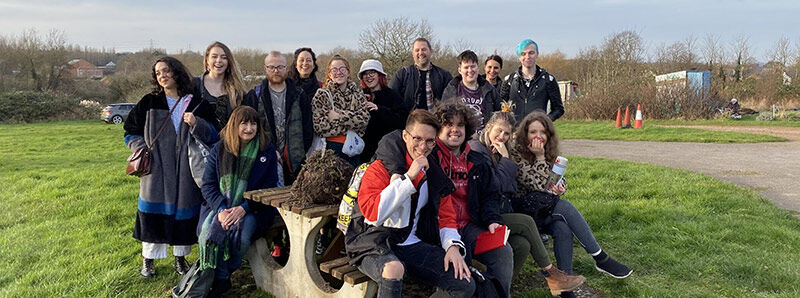
(Birmingham City Allotments Live Project)
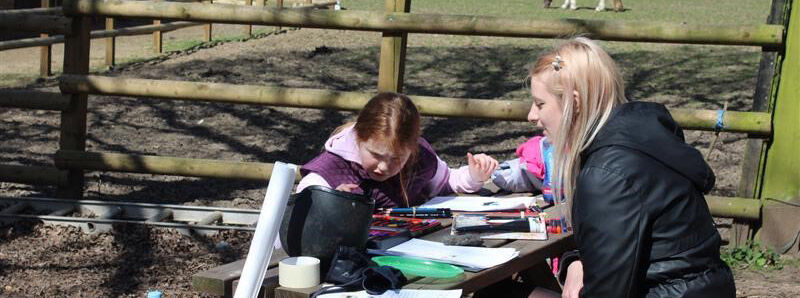
(Moseley Community Stables Art and Education Live Project)
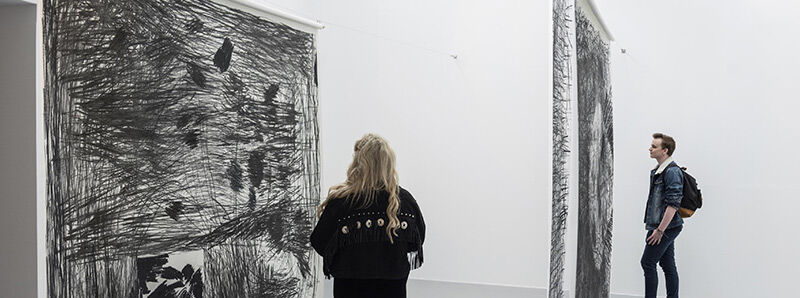
(Ikon Gallery Live Project)
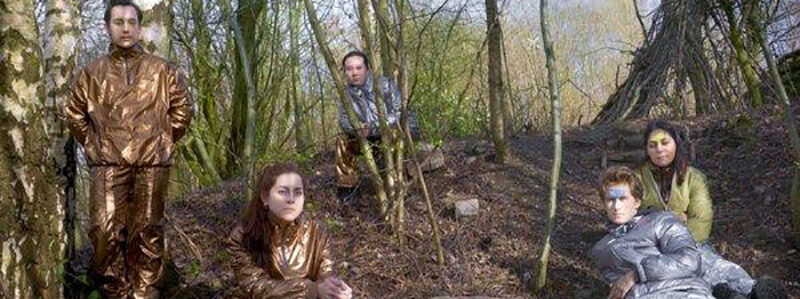
(Tate Gallery Live Project)
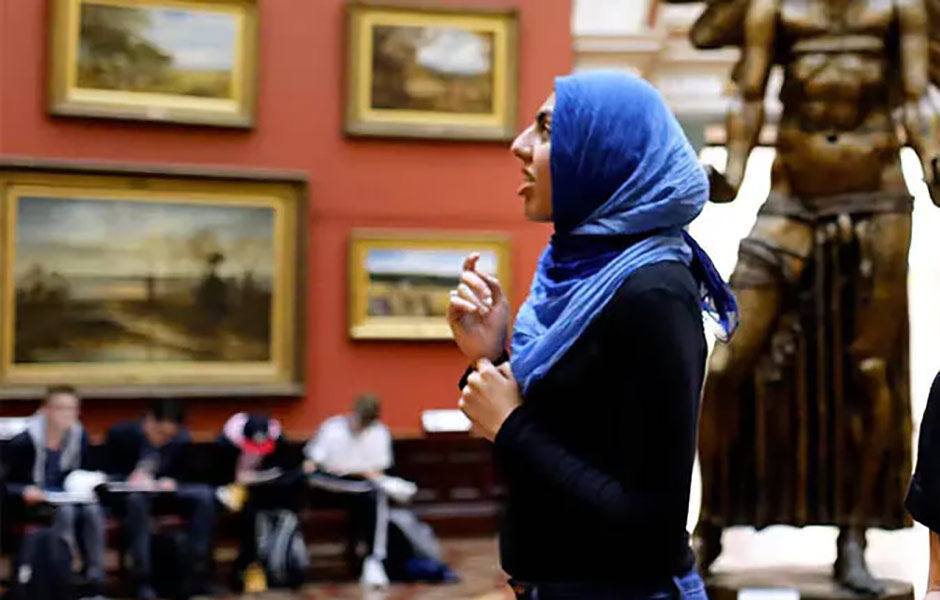
My first year studying Fine Art
Wondering what to expect from your first year as an art student? BA (Hons) Fine Art student Maryam Aisha gives an insight into the experience Birmingham City University offers and how to make the most of it.
Trips and visits
You may have the opportunity to participate in exchanges, placements, external projects and go on national and international study visits.
In previous years international trips have included visiting the Venice Biennale, New York, Berlin and Barcelona.
National trips have included visits to London, Liverpool and Bristol.
Employability
Enhancing your employability skills
With an increased focus on the importance of visible and viable career routes, the BA (Hons) Fine Art course at Birmingham City University explicitly deals with the importance of employability by embedding professional practice skills needed to allow graduates to ‘make a living’ in all modules. Digital competencies, project management, communication and problem-solving skills are a few of the key attributes the course develops.
The ambitious, student-centred approach to the curriculum, informed by professional practitioners and researchers, will enable you to become imaginative, confident and convincing in the taking and shaping of your future roles. Graduates will become creative leaders and practitioners of change.
Art is a highly individual practice and can often have a high degree of self-reflection but it is always a professional practice. Through a programme of lectures and seminars we enable you, the artists of the future, to understand your own economy and your contribution to the economy of our societies.
Live working is at the heart of the course. It enhances employability by offering you professional experiences and job opportunities which provide you with the competencies, strategies and confidence needed to shape your own futures and the future of the arts. By working with, for and alongside various organisations and stakeholders in the region, the course will demystify the hierarchical structures of the creative sector so you feel ‘at ease’ in these professional contexts.
Specifically you will:
- Develop a range of technical making, professional and personal skills, transferable to a range of careers within the creative industries; from artists, to directors, educators, curators, arts administrators and project managers.
- Develop your own practice and the ability to relate this to future employment options.
- Negotiate, plan exhibit and present work to a professional standard.
- Work independently and collaboratively.
- Be a self-motivated, organised, effective learner.
- Establish meaningful networks and connections in the city with individuals, organisations and communities.
- Understand how to promote yourself through a CV, statement, the use of social media, LinkedIn and individual professional websites.
- Be able to respond to the rapidly evolving creative industries, to not only be ready for immediate employment, but also for future evolutions within the industries through the long-term, future-fit skills you will acquire.
Placements
As a student on our BA Fine Art course you will be offered the choice of taking one of the ADM Faculty Modules. Each module will have a live focus whether that be working collaboratively across the City with students from across the faculty, working in industry on work experience placements or working with community groups on live project briefs.
The Faculty-wide modules allow for the crossover and building of networks between courses. Through these modules you will be integrated into the City of Birmingham, engaging with local contexts and negotiating external relationships whilst developing key employability skills. Recent live projects have seen students working with; Eastside Projects, Birmingham Hippodrome, Birmingham Museum and Art Gallery (BMAG), Wheatley Fellow Harun Morrison, Flat Pack Film Festival, Summerfield Stables in Hall Green, Turves Green Primary School and Tate Liverpool.
You will also have the option to take a year-long professional work placement sandwich year to spend time directly working in industry through our BA (Hons) Fine Art with Professional Placement Year. This presents a fantastic opportunity to gain confidence, build experience and develop workplace skills before graduating through a work-based learning opportunity. If you choose this route you will be supported by the course team in researching your chosen area of work and given advice to secure a placement (or placements) that enable you to develop key employability skills in a direct, interesting and meaningful way. It provides the opportunity to spend a year completing structured work experience anywhere in the world, before returning to Birmingham City University for the final year of the BA Fine Art course to apply what has been learnt working in industry.
Links to industry
We have a wide array of links with partner organisations regionally, nationally and internationally. These partnerships provide opportunities for live working in a professional context and are an important part of the learning and teaching activities on the BA (Hons) Fine Art course. The course offers creative opportunities for you to gain direct experience of working with professionals within fine art and related fields on curatorial projects, cross disciplinary opportunities, specialist masterclasses, external live projects and research-based activities.
Regional partners include: Birmingham Museum and Art Gallery, Ikon Gallery, Eastside Projects, Midlands Art Centre, New Walsall Gallery, Vivid Projects, Recent Activity, Grand Union, Queen Elizabeth Hospital, Birmingham Children’s Hospital, Hippodrome, the REP, The Library of Birmingham, Selfridges, Primary and Secondary Schools across the region.
National partners include: Arts Council England, Tate Britain, Tate Modern, Tate Liverpool.
International partners include: BCU has established links with institutions both in Europe and the USA, as well as in Hong Kong and India.
The creative and cultural industries play a significant role in unlocking innovation and growth in other sectors. The creative industries are defined by the UK government as “those industries which have their origin in individual creativity, skill and talent and which have a potential for wealth and job creation through the generation and exploitation of intellectual property”. The creative economy accounts for 1 in 10 jobs across the UK and Birmingham City University is one of the largest providers of graduates in creative disciplines of any University outside London and the South East.
Where our students go
Our students have gone on to work with companies such as:
- British Museum
- BBC
- Tate
And in jobs such as:
- Artist/Designer/Curator
- Exhibition Manager
- Gallery Education Coordinator
- Professional artist
- Curator
- Conservator
- Gallerist
- Art teacher
- Arts administrator
- Art consultant
- Tattooist
- Art critic/writer
- Artisan
- Community arts worker
- Public art project manager
- Art therapist
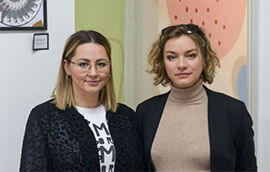
Alumni set to open new gallery in city’s historic Jewellery Quarter
A new gallery founded by two Art graduates is open in Birmingham’s historic Jewellery Quarter. Behind the exciting new venture are graduates Anna Katarzyna Domejko and Karolina Korupczynska.
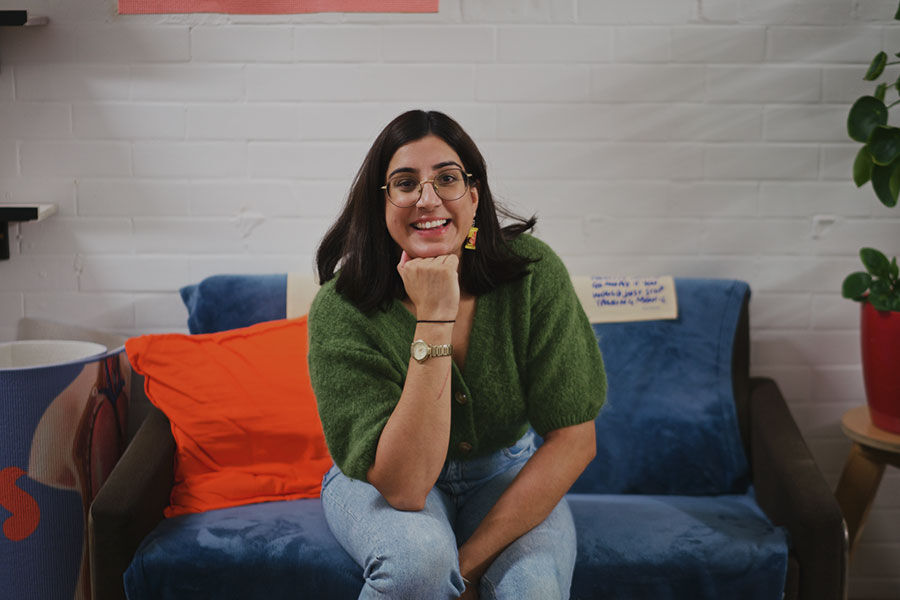
Roo Dhissou
Roo wasn’t sure what she wanted to do after graduating from her undergraduate degree, but her love of art has led her to complete a Master’s and now she’s almost completed her PhD. Alongside her studies, she’s also started her own printing press.
Facilities & Staff
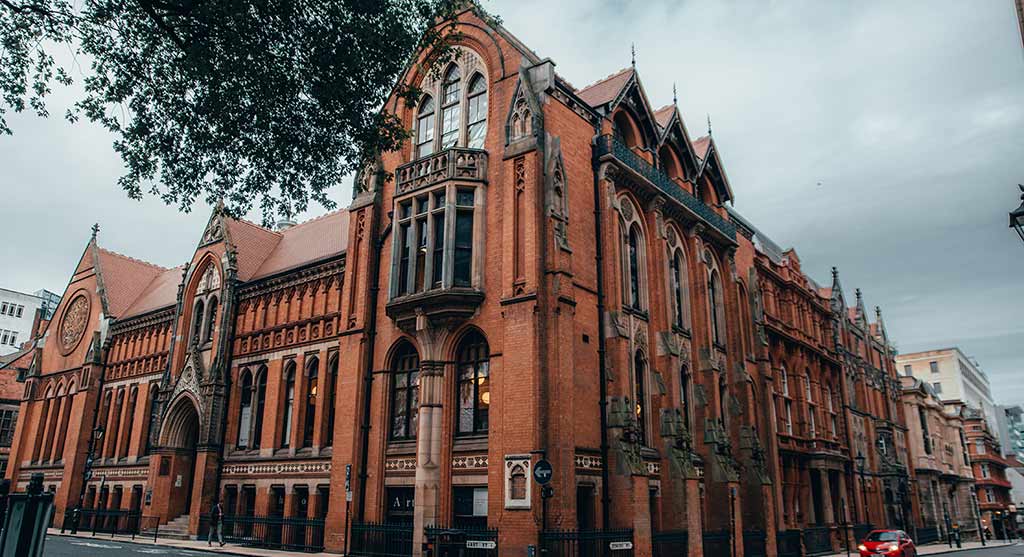
Our Facilities
In 1884 Birmingham Municipal School of Arts and Crafts - the first in the country, opened at Margaret Street. This building, with its rich history and rare heritage of practice-led knowledge, is home to our BA Fine Art course.
The studio is at the centre of fine art practice and this course utilises the unique purpose-built School of Art to offer studio spaces as sites of learning situated around specific discipline areas (painting and drawing, sculpture and installation, performance and digital media). As a student on BA (Hons) Fine Art you will be able to work fluidly within and through the studios both individually and together with other students in a community of practice.
The BA Fine Art course aims to celebrate and embed our history through the focus it places on technical, material and process-based fabrication skills. These skills are developed through and within our range of technical workshop facilities for photography, casting, woodwork, metalwork, silk screen, etching, 3D printing, laser cutting, and printed and constructed textiles.
The specialist library, workshops and studio facilities at the School of Art provide a hub of creative activity for you to immerse yourself within.
Our staff
Brian Bishop
Senior Lecturer in Fine Art; Course Director, BA (Hons) Fine Art
Brian Bishop is an American visual artist and educator based in the UK where he is a Senior Lecturer and Course Director for BA (Hons) Fine Art.
More about BrianSophie Mackfall
Lecturer
Sophie Mackfall is an artist living and working in Birmingham. She is interested in surfaces and the edges of things, both material and immaterial. Starting with the idea of horizon as a spatial constant and her body as a physical constant to work with and against, she uses economical devices such as a clothesline or the fold of an envelope to...
More about SophieAlis Oldfield
Lecturer
Alis Oldfield is an artist whose practice is inherently multidisciplinary, using varying means to immerse the viewer in constructed worlds. Focussing on willing suspensions of disbelief, her work plays with the fictions we create for ourselves. Revealing their own construction, these worlds cultivate friction between fiction and reality – examining...
More about AlisAndrew Gillespie
Lecturer in Fine Art
Andrew Gillespie is a contemporary artist based in Birmingham. He is interested in the collision of surfaces, structures and materials. He regularly translates familiar imagery and objects through printmaking and casting, exploiting the shift in status and content that occurs with each gesture. He makes composed constellations of works that often...
More about AndrewFranziska Schenk
Senior Lecturer in Fine Art
Franziska is an artist, researcher and educator whose practice has been located at the interface of Art, Science and Ecology for more than two decades. Notably, she has collaborated with scientists from the emerging fields of biomimetics and bio-photonics to introduce latest nature-inspired ‘smart’ materials and methodologies into Fine Art. Drawing...
More about Franziska